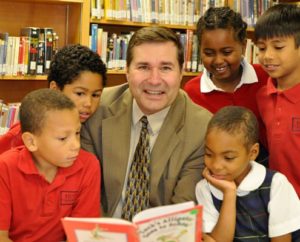
What does a Classical Christian School have to do with loving your neighbor as yourself? Head of School, Russ Gregg, shares how starting Hope Academy in his inner city neighborhood was ultimately a matter of justice and a matter of love. And the results have had a rippling effect throughout his community and beyond. God truly does provide!
 Russ Gregg (B.A., Global Studies, University of Wisconsin-Madison) has served as Head of School since Hope Academy’s founding in 2000. He has been a resident of the Phillips neighborhood since 1994. In 1999, he was an administrator at Calvin Christian School in Edina, and quit his job to help lay the groundwork for a Christian school for his urban neighbors. Russ and his wife, Phyllis, who teaches 3rd grade at Hope Academy, live four blocks away from the school. They have three grown children. Russ serves on the Board of Directors of the Society for Classical Learning. Russ Gregg is available to serve as a speaker or panelist. Common topics include: The Achievement Gap, Urban Christian Education, The Case for Christian Schooling, and sermons on various biblical passages.
Russ Gregg (B.A., Global Studies, University of Wisconsin-Madison) has served as Head of School since Hope Academy’s founding in 2000. He has been a resident of the Phillips neighborhood since 1994. In 1999, he was an administrator at Calvin Christian School in Edina, and quit his job to help lay the groundwork for a Christian school for his urban neighbors. Russ and his wife, Phyllis, who teaches 3rd grade at Hope Academy, live four blocks away from the school. They have three grown children. Russ serves on the Board of Directors of the Society for Classical Learning. Russ Gregg is available to serve as a speaker or panelist. Common topics include: The Achievement Gap, Urban Christian Education, The Case for Christian Schooling, and sermons on various biblical passages.
The Ripple Effect:
Hope Spreads When You Plant Classical Christian Schools in the Inner City
~ A Conversation with Russ Gregg
Estimated read time: 4 min. (771 words)
What would you do if your second grader couldn’t read?
In 2000, an inner city mother in Minneapolis, MN realized this awful truth.
She soon made a bold decision. One that would have a rippling effect for years to come. She enrolled her daughter in Hope Academy, the brand new Classical Christian School in her inner city neighborhood.
Because of this mother’s decision nineteen years ago, her daughter learned to read…graduated from high school…learned five different languages in college…and now is back at Hope Academy as a teacher.
Loving your neighbor as yourself might mean starting a Classical Christian School
On a recent BaseCamp Live Podcast, Russ Gregg, Hope Academy’s Head of School, shares this mother’s powerful story. He recounts how God brought their worlds together in Minnesota.
After moving into the Phillips neighborhood in 1994, Gregg would drive his own children across town to get a good Christ-centered education. For eight long years, he prayed that someone would fix the problem in his neighborhood. One Sunday morning, he felt God challenging him to quit his job and start a school for his neighbors.
“What does it mean to love your neighbor as yourself?” he ponders. “Doesn’t it mean that all of the advantages and opportunities that you want for your own children you should want for your neighbor’s children? It became a matter of justice and a matter of love.”
Classical Christian Education is not just for the wealthy or well off
Minnesota’s inner city was wracked by crime and poverty. It also suffered from a massive education problem. Only half of Gregg’s neighbors were even graduating from high school. Worse, while Minnesota boasted the highest college entrance ACT scores of any state in the country, the achievement gap between whites and minorities measured the worst in the nation.
Hope Academy opened its doors in 2000 with just three teachers and 35 students in grades K-2. Initially, it met at a location called Christ Church International. Hope soon moved into a building belonging to a failed public school.
Today, Hope serves over 500 students with 70% living below the poverty guidelines. In fact, the percentage of low-income families at Hope exceeds that of the public schools in Minneapolis. And economically disadvantaged students at Hope total more than twice the percentages of the state and nation.
Why Hope Academy chose the “Classical“ model
Gregg quotes Mortimer Adler, Founder and Editor-in-Chief of the Great Books of the Western World as well as The Syntopicon: An Index to the Great Ideas. According to Adler, “The best education for the best is the best education for all.” (The Paideia Proposal, by Mortimer J. Adler).
And for children living in a broken environment, Gregg believes that teaching classically means that the Liberal Arts become “liberating arts.” These lead people to “a real liberation of the soul…real freedom… and to enter into full responsibility of manhood and womanhood.” That’s good news for students in the inner city.
Setting up families and students for a lifetime of success
While typically only 15% of parents attend teacher/parent conferences in their neighborhood, 97% of Hope’s parents attend conferences the first week and 3% the next week. If not, parents are required to keep students home.
If students miss an assignment, they can’t go home on the school bus but must be picked up after completing their work.
And even parents receive a report card! They are graded on how they did following through on responses.
Some might consider such rules stringent, intrusive or even a waste of time in the inner city. While holding parents and students accountable proves one of the hardest parts of his job, the end result builds “habits of the heart that set a family and a student up for a lifetime of success,” Gregg says.
In fact, five to six graduating seniors have received between $800,000 and one million in college scholarship awards.
The ripple effect of Classical Christian Education at Hope Academy
Like a pebble thrown into the middle of a pond, Hope Academy has produced rippling effects emanating from the heart of its neighborhood.
Today, not only does that little girl, now grown, teach at Hope Academy, but her mother’s husband serves on the school’s board.
Key Takeaways
To learn more about Russ Gregg’s decision to start an inner city school and Hope Academy’s impact on the community, listen to the BaseCamp Live Podcast. You’ll also hear about the Spreading Hope Network that works with city leaders around the country to open similar inner city schools. The organization aims to identify and support three cities each year where Classical Christian schools can launch and change lives.
Key Links and Resources:
http://hopeschool.org
https://www.thegospelcoalition.org/article/the-exponential-growth-of-classical-christian-education/
